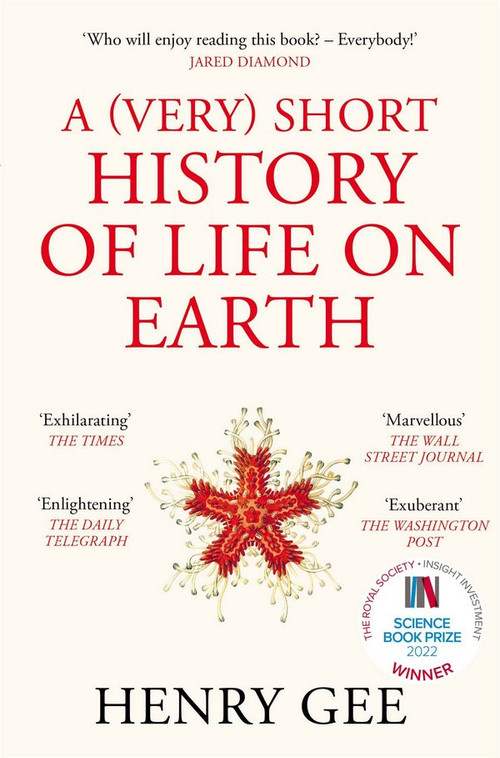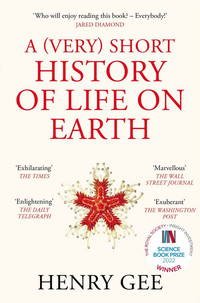
A (Very) Short History of Life On Earth
Gee Henry'Exhilaratingly whizzes through billions of years . . .
Gee is a marvellously engaging writer, juggling humour, precision, polemic and poetry to enrich his impossibly telescoped account . . .
[making] clear sense out of very complex narratives' - The Times'Henry Gee makes the kaleidoscopically changing canvas of life understandable and exciting. Who will enjoy reading this book?
- Everybody!' Jared Diamond, author of Guns, Germs, and SteelFor billions of years, Earth was an inhospitably alien place - covered with churning seas, slowly crafting its landscape by way of incessant volcanic eruptions, the atmosphere in a constant state of chemical flux. And yet, despite facing literally every conceivable setback that living organisms could encounter, life has been extinguished and picked itself up to evolve again.
Life has learned and adapted and continued through the billions of years that followed. It has weathered fire and ice. Slimes begat sponges, who through billions of years of complex evolution and adaptation grew a backbone, braved the unknown of pitiless shores, and sought an existence beyond the sea.
From that first foray to the spread of early hominids who later became Homo sapiens, life has persisted, undaunted. A (Very) Short History of Life is an enlightening story of survival, of persistence, illuminating the delicate balance within which life has always existed, and continues to exist today. It is our planet like you've never seen it before.
Life teems through Henry Gee's lyrical prose - colossal supercontinents drift, collide, and coalesce, fashioning the face of the planet as we know it today. Creatures are engagingly personified, from 'gregarious' bacteria populating the seas to duelling dinosaurs in the Triassic period to magnificent mammals with the future in their (newly evolved) grasp. Those long extinct, almost alien early life forms are resurrected in evocative detail.
Life's evolutionary steps - from the development of a digestive system to the awe of creatures taking to the skies in flight - are conveyed with an alluring, up-close intimacy.
Dostupné do 40 dní
Dostupné do 40 dní
Dostupné do 40 dní
Dostupné do 40 dní
Dostupné do 40 dní
Dostupné do 40 dní
Dostupné do 40 dní
Life has learned and adapted and continued through the billions of years that followed. It has weathered fire and ice. Slimes begat sponges, who through billions of years of complex evolution and adaptation grew a backbone, braved the unknown of pitiless shores, and sought an existence beyond the sea.
From that first foray to the spread of early hominids who later became Homo sapiens, life has persisted, undaunted. A (Very) Short History of Life is an enlightening story of survival, of persistence, illuminating the delicate balance within which life has always existed, and continues to exist today. It is our planet like you've never seen it before.
Life teems through Henry Gee's lyrical prose - colossal supercontinents drift, collide, and coalesce, fashioning the face of the planet as we know it today. Creatures are engagingly personified, from 'gregarious' bacteria populating the seas to duelling dinosaurs in the Triassic period to magnificent mammals with the future in their (newly evolved) grasp. Those long extinct, almost alien early life forms are resurrected in evocative detail.
Life's evolutionary steps - from the development of a digestive system to the awe of creatures taking to the skies in flight - are conveyed with an alluring, up-close intimacy.
Podobné tituly
Čitatelia s podobným vkusom si kúpili aj:
Naposledy prezerané

Aby ste mohli mať vlastný wishlist, musíte mať svoje konto
Aby ste mohli používať wishlist v našom internetovom kníhkupectve, musíte sa najprv prihlásiť. Ak u nás ešte nemáte vlastné konto, môžete si ho vytvoriť registráciou.















